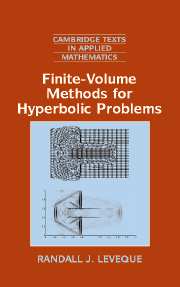Book contents
- Frontmatter
- Contents
- Preface
- 1 Introduction
- Part I Linear Equations
- 2 Conservation Laws and Differential Equations
- 3 Characteristics and Riemann Problems for Linear Hyperbolic Equations
- 4 Finite Volume Methods
- 5 Introduction to the CLAWPACK Software
- 6 High-Resolution Methods
- 7 Boundary Conditions and Ghost Cells
- 8 Convergence, Accuracy, and Stability
- 9 Variable-Coefficient Linear Equations
- 10 Other Approaches to High Resolution
- Part II Nonlinear Equations
- Part III Multidimensional Problems
- Bibliography
- Index
8 - Convergence, Accuracy, and Stability
Published online by Cambridge University Press: 05 September 2012
- Frontmatter
- Contents
- Preface
- 1 Introduction
- Part I Linear Equations
- 2 Conservation Laws and Differential Equations
- 3 Characteristics and Riemann Problems for Linear Hyperbolic Equations
- 4 Finite Volume Methods
- 5 Introduction to the CLAWPACK Software
- 6 High-Resolution Methods
- 7 Boundary Conditions and Ghost Cells
- 8 Convergence, Accuracy, and Stability
- 9 Variable-Coefficient Linear Equations
- 10 Other Approaches to High Resolution
- Part II Nonlinear Equations
- Part III Multidimensional Problems
- Bibliography
- Index
Summary
Whenever we use a numerical method to solve a differential equation, we should be concerned about the accuracy and convergence properties of the method. In practice we must apply the method on some particular discrete grid with a finite number of points, and we wish to ensure that the numerical solution obtained is a sufficiently good approximation to the true solution. For real problems we generally do not have the true solution to compare against, and we must rely on some combination of the following techniques to gain confidence in our numerical results:
Validation on test problems. The method (and particular implementation) should be tested on simpler problems for which the true solution is known, or on problems for which a highly accurate comparison solution can be computed by other means. In some cases experimental results may also be available for comparison.
Theoretical analysis of convergence and accuracy. Ideally one would like to prove that the method being used converges to the correct solution as the grid is refined, and also obtain reasonable error estimates for the numerical error that will be observed on any particular finite grid.
In this chapter we concentrate on the theoretical analysis. Here we consider only the Cauchy problem on the unbounded spatial domain, since the introduction of boundary conditions leads to a whole new set of difficulties in analyzing the methods. We will generally assume that the initial data has compact support, meaning that it is nonzero only over some bounded region.
- Type
- Chapter
- Information
- Finite Volume Methods for Hyperbolic Problems , pp. 139 - 157Publisher: Cambridge University PressPrint publication year: 2002



